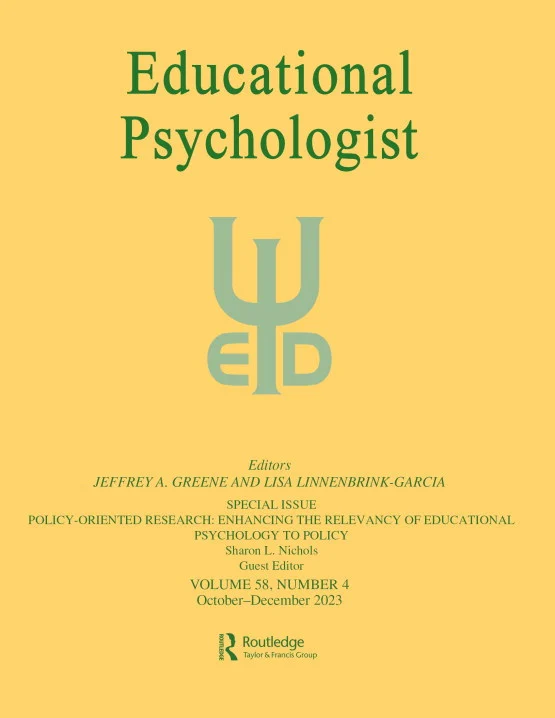Self-regulatory processes within and between diverse goals: The multiple goals regulation framework
IF 11.4
1区 心理学
Q1 EDUCATION & EDUCATIONAL RESEARCH
引用次数: 6
Abstract
Abstract As the pursuit of multiple goals is an inescapable reality in everyday life, students are consistently challenged to self-regulate toward achieving an array of academic goals as well as social and well-being goals. Nevertheless, prominent self-regulated learning models are limited in explaining and guiding how students can self-regulate in the context of multiple goals. Hence, we developed the multiple goals regulation framework that reconceptualizes how students establish, pursue, and adapt an array of goals. We illustrate specific processes (e.g., goal prioritizing, goal shielding, goal switching) that students can engage in to self-regulate both within and between goals. The new framework contributes to the literature in three main ways. First, we challenge the traditional conceptualization of effective self-regulated learning that focuses on the persistent pursuit of a single academic goal without considering the interdependent nature of goals. Second, we facilitate a sustainable and adaptive cycle of self-regulatory processes by highlighting the importance of navigating and negotiating between multiple academic and nonacademic goals. Finally, our effort offers a more inclusive understanding of students’ lived experiences by acknowledging a diverse set of goals that are closely attached to their social and cultural identities.不同目标内部和之间的自我调节过程:多目标调节框架
由于追求多重目标是日常生活中不可避免的现实,学生们一直面临着自我调节以实现一系列学术目标以及社会和幸福目标的挑战。然而,突出的自我调节学习模式在解释和指导学生如何在多目标背景下进行自我调节方面是有限的。因此,我们开发了多目标调节框架,重新定义了学生如何建立、追求和适应一系列目标。我们举例说明了具体的过程(例如,目标优先排序,目标屏蔽,目标切换),学生可以参与在目标内部和目标之间进行自我调节。新的框架对文献的贡献主要体现在三个方面。首先,我们挑战了传统的有效自我调节学习的概念,这种概念关注于对单一学术目标的持续追求,而不考虑目标的相互依赖性。其次,通过强调在多个学术和非学术目标之间进行导航和谈判的重要性,我们促进了自我监管过程的可持续和适应性循环。最后,我们的努力通过承认与学生的社会和文化身份密切相关的一系列不同目标,为学生的生活经历提供了更包容的理解。
本文章由计算机程序翻译,如有差异,请以英文原文为准。
求助全文
约1分钟内获得全文
求助全文
来源期刊

Educational Psychologist
Multiple-
CiteScore
19.10
自引率
3.40%
发文量
16
期刊介绍:
The Educational Psychologist is a scholarly journal dedicated to exploring the psychology of learning and instruction. Articles in this journal encompass a diverse range of perspectives, from examining psychological mechanisms to exploring social and societal phenomena related to learning and instruction. The journal publishes theoretical and conceptual articles, as well as reviews and meta-analyses, that significantly contribute to theory or advance the methods used to explore educational psychology. Emphasizing innovation and advancing understanding, the journal does not publish articles solely reporting the methods and results of empirical studies; instead, all submissions, including reviews and meta-analyses, must offer clear implications for advancing theory. In addition to regular articles, the journal features special issues that delve into important themes in educational psychology, along with focal articles accompanied by peer commentary.
 求助内容:
求助内容: 应助结果提醒方式:
应助结果提醒方式:


